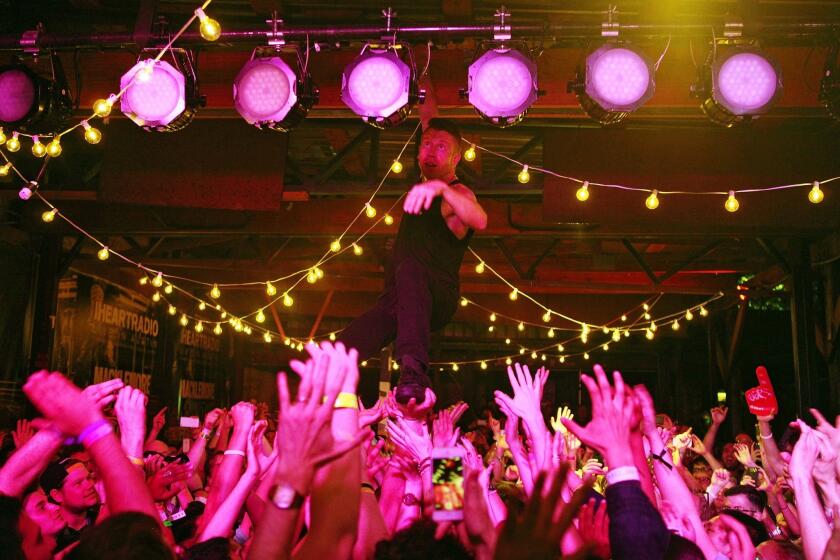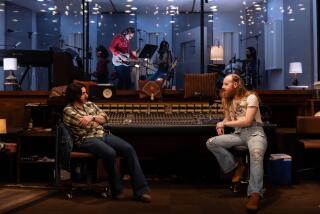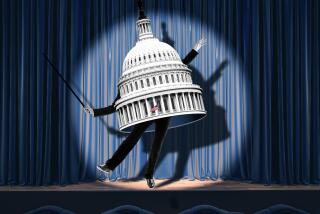Commentary: The show must not go on. Why the theaters contemplating coronavirus should close, now
- Share via
While public health experts are advising Americans to telecommute, avoid large crowds and wash their hands compulsively, Broadway is announcing big discounts.
Producer Scott Rudin slashed prices on remaining seats this month for shows that usually command top dollar. Want to see “To Kill a Mockingbird,” “West Side Story” or “The Book of Mormon?” Now is your chance, if you’re willing to risk exposure to coronavirus.
Eric Krebs, producer of the off-Broadway show “Romeo & Bernadette: A Musical Tale of Verona and Brooklyn,” issued an unusual statement.
“Mass hysteria ... global economic slowdown ... canceled events, performances, college classes and festivals left and right ... infection count and body count rising each hour.
The hit musical’s return to L.A. for an eight-month run has been paused, following major cancellations elsewhere in the theater world.
“What’s an off-Broadway theatrical producer with a joyous, well-reviewed new musical which is about to begin performances to do?”
His answer: “Set up one whole performance to give this happy musical as a total gift to 200 New York City high school students.”
When I read these words online yesterday, I had to double-check that the source was Broadwayworld.com and not the Onion. With a global pandemic that has schools debating whether to close and Dr. Anthony Fauci prescribing social distancing to the nation, this anxious producer has decided to lure youngsters to the theater with free tickets. What a guy!
Ah, but don’t think industry leaders aren’t prepared to make sacrifices. Broadway announced a draconian stage-door policy that will allow stars to abscond after their shows with a mere wave. No more signing autographs or smiling for selfies. Yes, I’m feeling a lump in my throat too.
Meanwhile, closer to home, I’m getting emails from theaters reassuring me that they’re taking every precaution. Hand-sanitizer stations are being installed, disinfectant is being sprayed and policies are being enacted so that those who are coughing, sneezing and running a temperature can easily exchange their tickets, all penalty fees waived in a gracious nod to epidemiology.
Apparently, the show must go on even if it kills us. While the country is staring down the barrel of a public health catastrophe, theaters are up against a different enemy: their ragged balance sheets.
Ignorance and denial, enabled by the dithering of local and federal government officials, are allowing producers and artistic leaders to pretend that the crisis isn’t as bad as the medical experts are claiming. Or perhaps the point is simply to mitigate the financial damage by delaying as long as possible.
But by staying open, theaters are not just acting shortsightedly. They’re betraying their core constituency, older patrons, who are the group most vulnerable to coronavirus.
Coachella, SXSW, “Hamilton,” the next “Fast and Furious” movie and even Disneyland have been affected by the coronavirus. But wait — there’s more.
The point of acting now before community spread becomes rampant is to ease the burden on our health care system, which in a few weeks could bring us to where Wuhan, China, was only recently. Scientists are sounding the alarm. The window when mitigation can have the biggest effect is rapidly closing.
Here’s an idea for performance addicts: Let’s take a break from the crowds and discover what’s available online. I’m looking forward to seeing “Passion” this weekend at Boston Court Pasadena, but is a smaller venue any safer? If I were a senior with an underlying health condition, I would certainly heed the warning of Los Angeles County Department of Public Health Director Barbara Ferrer about attending public events. If I go, I’ll go solo. I was raised Catholic — I don’t need any more guilt.
For those artists whose dreams and checking accounts are being shattered by this crisis, the pain is hard to fathom. Political action is the only way to deal with the nation’s tenuous social safety net. But perhaps Shakespeare’s example can assuage some career anxiety. When the plague hit London in 1592, Shakespeare was a young playwright just making his mark. Rather than rue his bad luck, he turned to poetry and became renowned as the author of “Venus and Adonis” and “The Rape of Lucrece,” honing skills that would only sharpen the verbal dexterity of his plays when the theaters reopened.
I’m as much of a tennis nut as I am a theater lover and I’m gutted that the 2020 BNP Paribas Open, which was to have started this week in Indian Wells, Calif., has been called off. But I have profound respect for the organizers for putting public safety over profit.
Yesterday, it was reported that performances in Berlin would not take place “in large halls at state theaters, opera houses and concert halls.” The German capital isn’t worried about losing its standing as a cynosure of European art. Hospital havoc is the main concern.
The coronavirus is a global phenomenon that requires a local response.
One source of stressful perplexity these days is the inconsistency of the response. Coachella is off but operas (held indoors with a much older demographic) are still taking place. Many universities have moved to online instruction but others are in a wait-and-see mode. This concert tour is canceled but this band doesn’t want to disappoint its fans (or money managers).
What’s a theater critic to do? I don’t have masks, and if I did, I’d donate them to the nearest hospital. I have some hand sanitizer, but not enough to get me through the spring season.
The only thing I can do is be an active participant in the education that all of us are undergoing. Information is our only medicine at this point. Panic won’t help, but preparedness is imperative. The old normal isn’t coming back anytime soon. The sooner we accept this, the safer everyone will be.
I told my 79-year-old mother to forgo any theater outings. I didn’t ask her to skip Mass because I knew that would be a lost cause. Martyrdom doesn’t scare her. But it does scare me. Theater has given me my life, but I don’t think it’s worth dying for.
More to Read
The biggest entertainment stories
Get our big stories about Hollywood, film, television, music, arts, culture and more right in your inbox as soon as they publish.
You may occasionally receive promotional content from the Los Angeles Times.












